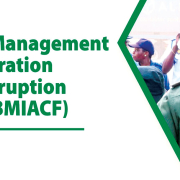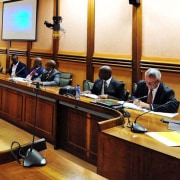|
Getting your Trinity Audio player ready...
|
The National Prosecuting Authority (NPA) has denied that Advocate Glynnis Breytenbach, head of NPA’s Pretoria Commercial Crimes Unit, has been suspended.
The authority said on Friday 17 February 2012 that it was waiting for her response to the charges before deciding how to proceed.
A statement by NPA executive manager of communications Bulelwa Makeke expressed frustration at media speculation surrounding the case, and said they expected a response from Breytenbach soon.
Despite widespread speculation, there has been no clarification on what the charges involve.
Charges against Breytenbach come amid a game of musical chairs surrounding appointments to the head of NPA and the Special Investigating Unit (SIU).
It also follows the removal of another crime fighter Gerrie Nel from two key cases – those of drug lord Glenn Agliotti and crime intelligence boss Mulangi Mphego. Mphego’s case has since been struck off the roll.
The SIU and the NPA are key to fighting corruption, and the ongoing disruptions over the appointment of unit heads and senior staff members are bound to have a profound effect – not only on public confidence, but performance of staff working with this kind of uncertainty.
And it seems unlikely that the senior appointment problems are likely to be settled in the near future, with objections being lodged against possible replacements and those holding temporary positions in these key organisations.
There is speculation as to whether Breytenbach’s charges relate to her investigation into suspended crime intelligence boss Richard Mdluli – accused of misusing state funds and murder, or fraud charges against Imperial Crown Trading (ICT) on a mineral and mining rights deal.
On December 21 2011 President Jacob Zuma appointed Advocate Nomvula Mokhatla as acting head of the SIU, replacing then deputy director of public prosecutions Nomgcoba Jiba, who had been acting as head of the SIU following the resignation of Advocate Willem Heath.
Heath resigned soon after accusing former president Thabo Mbeki of orchestrating rape and corruption charges against Zuma. He had only been appointed in November that year.
Jiba was a controversial appointment at the time, because she was previously suspended from the NPA for allegedly assisting a police investigation against her colleague and senior prosecutor Gerrie Nel in 2007.
At the time Nel was the head of the Scorpions crime-fighting unit which was disbanded by Zuma’s government.
On December 28 2011 Zuma accepted the Supreme Court of Appeal decision to strike down his appointment of Menzi Simelane as national director of public prosecutions. Ziba, who was then deputy NPA head, was to act in the post.
The appeal court found that Zuma and Justice Minister Jeff Radebe had failed to consider concerns raised about Simelane in a report by former speaker of parliament Frene Ginwala, and failed to consider his sidelined predecessor Vusi Pikoli’s fitness to hold office.
What gives substance to the speculation relating to Breyenbach’s ICT involvement, is that Menzi Simelane allegedly removed her from the case shortly before he himself was removed.
The awarding of the multibillion-rand Sishen iron ore mining deal to ICT was invalidated by the North Gauteng High Court and given to Kumba Iron Ore.
ICT allegedly has links to, among others, the Gupta family, who own and run The New Age and who have been identified as having a good friendship with Zuma and deputy president Kgalema Motlanthe.
Questions are also being asked about the retirement in 2010 of former Specialised Commercial Crime Unit head Chris Jordaan, after months of debate around the restructuring of the unit.
“The phrase 'our people are our greatest assets' applies strongly to the justice system. It's not the place to make controversial appointments that invite constant changes in leadership,” says Corruption Watch director David Lewis.
“It requires strong, stable leadership unblemished by personal controversy. Until that happens we will suffer unacceptable levels of corruption.”
Reshuffling and infighting around positions at the NPA aside, the organisation has managed to reduce the prosecutorial vacancy rate from 16.5% in the 2009/10 financial year to 12.2% in 2010/11, according to its latest financial year report.
But it does concede in the document that despite decreasing vacancies from 24.9% in 2008/09 to 12.2%, Operation Recruitment Drive, launched to fill vacancies, did not “achieve the desired results” and the NPA “continues to experience considerable difficulty to attract staff from the outside”.
It goes on to say that lack of capacity is compounded by the difficulty to speed up recruitment, particularly in the lower courts where prosecutors have to share offices or sit in temporary offices.
This could explain why the number of national, regional and district court cases finalised in the 2010/11 financial year, dropped from 469 541 the year before to 460 891 in 2010/11.
But this was also attributed to challenges presented by redirecting staff to special courts during the 2010 Fifa World Cup.
District courts make up 91% of the judgments.
Despite requests by Corruption Watch, information regarding how many prosecutors are facing internal disciplinary processes was not furnished by the department.








